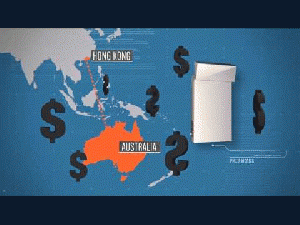Reprinted from Smirking Chimp
Washington politics always involves a high level of silliness (does President Obama really love America?), but when it comes to trade policy it shifts to full-fledged craziness. Anything is fair game when the political establishment wants to pass major trade agreements like NAFTA or the Trans-Pacific Partnership (TPP). At such times we see respectable Washington types making pronouncements bearing so little relationship to reality that they would cause Sarah Palin to cringe.
The Washington Post gave us one such gem last week when it took issue with those saying that currency rules should be part of any new trade pact. Its lead editorial last Thursday argued against including any provisions on currency. Its main point is best summarized by a paraphrase of an old Barbie line: "Currency values are hard."
The Post argued that it would be impossible to distinguish between policies intended for other purposes, like the Fed's quantitative easing (QE) program, which was designed to boost growth, and policies whose main purpose is to depress the value of the currency. An assertion like this in the context of a debate on trade is laughable.
Every provision in trade agreements will have ambiguities, most of which are much more difficult to resolve than this one. Trade deals all prohibit export subsidies, almost by definition. But what about publicly funded vocational training in which the government picks up much of an exporter's training costs? What about publicly financed infrastructure that reduces the exporter's cost to send its products out of the country?
What about publicly financed research (e.g., the National Institutes of Health) that hugely reduce the cost to private firms of innovation? What about below-market interest loans provided by the Export-Import Bank? If the Post is really concerned about potential ambiguities raising difficult enforcement issues, then it should be staunchly opposed to restrictions on export subsidies, since many of these issues actually are hard.
As a practical matter, it really is not difficult to recognize governmental actions intended to affect currency values. Fred Bergsten, the former president of the Peterson Institute for International Economics and an ardent supporter of free trade, came up with a list of conditions a few years back.
At the center of this list was the accumulation of a massive amount of foreign exchange reserves and large and persistent trade surpluses. It also helps that most of the countries accused of currency "manipulation" explicitly target the value of their currency. If the Post's editorial board and others can't tell the difference between these actions and QE, then maybe they are in the wrong line of work.
As crazy as this story is, the rest of the argument is even better. The Post tells us that adding currency rules "at this late date could cause a rebellion by TPP negotiating partners, possibly scuttling the entire project, along with all the benefits, geopolitical and economic, of knitting major Pacific Rim economies together under the aegis of U.S.-style free trade."
Actually, many of us had been complaining about currency values for a long time. The reason that the issue is being pressed "at this late date" is that there was no opportunity for action earlier. With fast-track trade authority finally being taken up by Congress, this is the first chance for the public to weigh in on the trade deal. So the Post's argument here is essentially that we kept the deal out of public sight for so long (it is still secret) that it is now too late for the public to weigh in.
The issue about a rebellion by our trading partners is also entertaining. There are many issues in the TPP that our trading partners don't like. They don't like rules that will force them to pay more for drugs from Pfizer and Merck, nor do they like rules that will make them pay more money to Time Warner for Hollywood movies, or to Microsoft for software. But President Obama and the Post were willing to risk a rebellion from our trading partners to get higher profits for the pharmaceutical, entertainment, and software industries. It is only when the question is one of jobs for U.S. workers that the risk of such a rebellion becomes an unacceptable price.
Finally, the bad story that we are supposed to fear, "scuttling the entire project," should arouse howls of derision everywhere. Wow, all those industry folks spent years trying to craft a deal that would boost their profits by circumventing laws and regulations in the U.S. and elsewhere, and now their efforts may prove pointless? Pass the handkerchief! I can't hold back the tears.
On the serious side, we could have trade deals that would advance the interests of workers in the United States. For example, if we focused on reducing patent and copyright protections nationally and internationally, we could save hundreds of billions annually on drugs and other products. We could also loosen professional barriers that cause our doctors to earn twice as much as their counterparts in other wealthy countries, leading to huge savings in healthcare costs.
But these items are not on President Obama's trade agenda. Rather, it is dominated by a list of measures that are likely to increase inequality. And if his trade deals are defeated because they refuse to take any steps to redress the trade deficit and the loss of well-paying manufacturing jobs to trade, it will not be bad news for the country.






